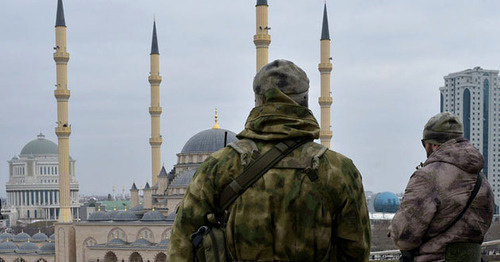
19 December 2016, 17:00
Clashes in Grozny indicate recruitment of new militants
The attack on policemen and shootouts in Chechnya indicate the presence of people in the republic, who can activate for committing sabotage actions and who are disgruntled with actions of Chechen authorities, said the experts, interviewed by the "Caucasian Knot".
The "Caucasian Knot" has reported that in the evening on December 17, the counterterrorist operation (CTO) regime was introduced in Grozny. Power agents reported that four militants had been killed in a shootout, and two others were hospitalized with gunshot wounds. In the afternoon on December 18, they blocked a private house in an outskirt of Grozny. According to power agents, three militants were killed there, and two others were detained. Thus, in total, during two days, seven militants were killed, and four others were detained, three of them were wounded. Four policemen were also killed; and one policeman was wounded.
In the opinion of Oleg Orlov, a member of the Board of the Human Rights Centre (HRC) "Memorial", the attacks of Chechen militants on the New Year Eve have to do with a broad resonance in the media.
"Indeed, militants have a 'strange' tradition to commit something in Grozny close to the New Year. It's quite possible that it's dated to the end of the year, the holiday, when the event will be strongly focused by mass media. It's likely that militants take this into account," Mr Orlov told the "Caucasian Knot" correspondent.
Orkhan Jemal, a journalist and a columnist of the "Snob" Magazine, agrees that the activation of militants is associated with the upcoming holidays.
He admits that there is still some armed underground in Chechnya, the members of which "were not liquidated, but lay down onto the bottom."
The attack was pre-planned in order to damage the image of Kadyrov; and for this purpose they chose the end of the year – the time of summing up, said Ekaterina Sokiryanskaya, the head of the project for Russia and Northern Caucasus of the International Crisis Group (ICC).
She said that the attack "was hardly a carefully planned operation; rather, it was a desperate sortie of embittered and angry young men, which had an element of a revolt. They had no aim to find and kill a particular law enforcer – they killed those whom they met first, or who were easier to attack. Their aim was to somehow hurt Kadyrov, to show that there are people ready to resist, even at the cost of their lives, and to commit something resonant."
Full text of the article is available on the Russian page of 24/7 Internet agency ‘Caucasian Knot’.
Author: Oleg Krasnov, Tatiana Gantimurova Source: CK correspondents




